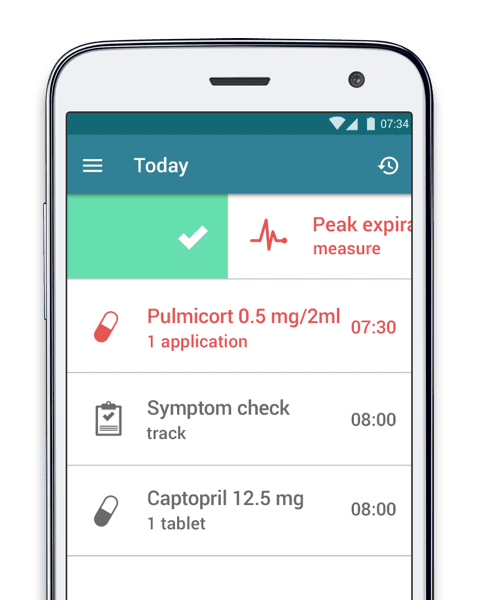Asthma is one of the leading causes of chronic illness in the UK. Over 12% of the population – 8 million people – have been diagnosed with asthma, more than all other lung conditions combined. However, since many children who are diagnosed with asthma eventually grow out of it, the number of people living with the condition is much smaller. According to Asthma UK, 5.4 million people are currently receiving treatment for asthma, and for many, it is a lifelong condition.
While there is no cure for asthma, the symptoms such as dyspnea or a cough can be treated with the right medication and regular checks of pulmonary function. In addition to regular visits to the doctor, affected persons can do a lot in their daily life to alleviate their symptoms and prevent an asthma attack. We’ve created an infographic that provides information on different types asthma and helpful tips on managing asthma, the different types of medication available, how to use metered dose inhalers, and are there apps that can help me manage my treatment?

What is Asthma?
Asthma is a chronic, inflammatory disease of the respiratory tract. The inflamed and narrowed bronchial tubes result in breathing difficulties, seen in symptoms such as coughing, wheezing, breathlessness, and chest tightness. There is two main types of asthma, extrinsic and intrinsic asthma. Extrinsic asthma, also called allergic asthma, occurs predominantly in children and is triggered by external stimuli such as animal dander or pollen. Intrinsic asthma or non-allergic asthma is particularly common among adults and can be triggered by infection, nonspecific irritants such as fumes, and cold air. There is also mixed type asthma, which is a combination of allergic asthma with a hypersensitivity to unspecific irritants like scent or cigarette smoke.
Are there ways to ease my Asthma symptoms?
Regular checkups with your GP and allergist or pulmonologist is the best thing you can do to manage your asthma. Your doctor can thoroughly check your lung function and prescribe you the right medication. “Controllers” are long-term medications for asthma relief, aimed at preventing asthma attacks from happening. “Relievers” can relieve the symptoms as short-term emergency medication. But medications only work if they are used properly. Always keep the correct technique in mind when using a metered dose inhaler. A proactive approach to asthma and a healthy lifestyle can also help get asthma under control. Additionally, the following apps and resources can help with adjusting to a new lifestyle, and managing treatment:
Maintain an exercise routine.
Many people avoid exercise, for fear of triggering an asthma attack. However, the right activity can improve asthma symptoms. Studies have shown that 30 minutes of cycling, walking, or light yoga can relieve symptoms. Relaxation exercises and meditation with a focus on breathing technique help to reduce stress and also improve asthma symptoms. Apps like Runtastic can help you create your own fitness plan and motivate you to workout. Consult your physician before starting a new training program, to keep the intensity appropriate to your health condition.
Take your medication, regularly and correctly
Medicine can help alleviate your symptoms and prevent asthma attacks - if you take it properly. Asthma apps like MyTherapy (for Android and iOS) can help: the App reminds you of your asthma medications like Spiriva, Beclometason or Pulmicort. Additionally, explanatory videos will show you how to use your inhaler correctly. Record your peak flow readings, symptoms, and exercise in the asthma journal, keeping track of the values and your progress. MyTherapy adheres to strict data protection and confidentiality laws, so your data is safe, and never shared with third parties.
Live healthy
A healthy diet strengthens the immune system. Look for a balanced diet with enough fruit and vegetables. If you are suffering from a food intolerance, you should avoid the food that is incompatible with you, e.g. soy or nuts. Stay hydrated, try to drink at least 2 liters of water per day. This will facilitate coughing in the bronchial tubes. Get rid of bad habits: Smoking can exacerbate respiratory insufficiency and cause asthma. You should rid yourself of this habit as quickly as possible. The QuitNow! App helps you to live smoke-free.
With the right medical treatment and a proactive attitude towards managing your asthma, you can do a lot to prevent an asthma attack.


